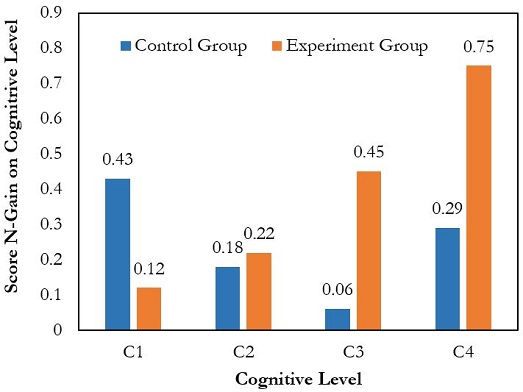
Using Brain-Based Learning to Promote Students’ Concept Mastery in Learning Electric Circuit
Abstract
Teaching approaches in some school are still concentrating on memorizing. Teachers have to make the learning is meaningful for the students. One of the alternative tool is by using Brain-Based Learning. The purpose of this study is to investigate the effect of Brain-Based Learning on students’ concept mastery in learning electric circuit for 8th-grade students. The method used in this research was experimental research. The research design that used is pretest and posttest design. The sample was taken by cluster random sampling technique. Participants were 49 students at one of International Secondary School in Bandung, West Java, Indonesia. Experiment group learn with Brain-Based Learning (N=26) while control group learn with lectured based learning (N=23). The results of students’ concept mastery that learned using Brain-Based Learning is better than students’ concept mastery that learned using lectured-based learning. The improvement of students’ concept mastery can be noticed by independent t-test with significant 0.003. Based on the analysis of students’ concept mastery results, the N-Gain score in experiment group is 0.43 which categorized as medium improvement while in control group is 0.25 which categorized as low improvement. Based on this results showed that Brain-Based Learning can be an alternative tool to improve students’ concept mastery significantly.
Full Text:
Download PDFReferences
Akyürek, E., & Afacan, Ö. (2013). Effects of Brain-Based Learning Approach on Students ’ Motivation and Attitudes Levels in Science Class. Mevlana International Journal of Education, 3(1), 104–119.
Aljorani, Y. (2008). Teaching design according to brain-based learning and its impact on the achievement of 9th-grade students in biology and development of their scientific thinking. Baghdad, Iraq: University of Baghdad.
Anderson, L. W., & Krathwohl, D. R. (Eds.). (2001). A Taxonomy for Learning, Teaching, and Assessing. New York: Addison Wesley Longman, Inc.
Al-Tarawneh, M. (2016). The Impact of a Teaching-Learning Program Based on a Brain-Based Learning on the Achievement of the Female Students of 9th Grade in Chemistry. Higher Education Studies, 6(2), 162.
Caine, R., & Caine, G. (1997). Making Connection: Teaching and Brain. Alexandria, VA: ASCD.
Creswell, J. W. (2012). Educational Research Fourth Edition. Boston: Pearson.
Duman, B. (2010). The Effects of Brain-Based Learning on the Academic Achievement of Students with Different Learning Styles. Educational Sciences: Theory & Practice Educational Sciences: Theory & Practice, 10(4), 2077–2103.
Fraenkel, J. E., Wallen, N. E., & Hyun, H. H. (2012). How To Design and Evaluate Research In Education. New York: Mc Graw Hill.
Haghighi, M. (2013). The effect of brain-based learning on Iranian EFL achievement and retention. Procedia - Social and Behavioral Sciences, 70, 508–516.
Hake, R. R. (1999). Analyzing Change/ Gain Score. Retrieved from http://www.physics.indiana.edu
Jbeili, I. M. A. (2013). The Impact of Digital Mind Maps on Science Achievement among Sixth Grade Students in Saudi Arabia. Procedia - Social and Behavioral Sciences, 103, 1078–1087.
Jensen, E. (2008). Brain-Based Learning (Second). California: Corwin Press.
Jensen, E. (2012). Teaching with the brain in mind, workshop held. USA, San Antonio. Retrieved from http://www.jennsenlearning.com/pdf/10mosteffectiveTips.pdf
Klauer, K. J. (1988). Teaching for learning-to-learn: a critical appraisal with some proposals. Instructional Science, 17(4), 351–367.
Klinek, S. R., & Indiana. (2009). Brain-based Learning: Knowledge, Beliefs, and Practices of College of Education Faculty in The Pennsylvania State System of Higher Education. Vasa, (May), 1–188. Retrieved from http://medcontent.metapress.com/index/A65RM03P4874243N.pdf
Liégeois, L., Chasseigne, G., Papin, S., & Mullet, E. (2003). Improving high school students’ understanding of potential difference in simple electric circuits. International Journal of Science Education, 25(9), 1129–1145.
Marshall, B. (2002). The secrets of getting better grades: Study smarter not harder (2nd edition). Park Avenue: JIST Publishing, Inc.
Obeidat, T., & Abussameed, S. (2013). Brain function-based Learning. Retrieved from http://www.anawatifly.blasspo
Ozden, & Gultekin. (2013). The Effects of Brain-Based Learning on Academic Achievement and Retention of Knowledge in Science Course. Electronic Journal of Science Education, 12(1), 1–17.
Redis, E. F., & Steinberg, R. N. (1999). Teaching Physics: Figuring Out What Works. Physics Today, 52. Retrieved from https://www.physics.umd.edu/perg/qm/qmcourse/NewModel/research/whatwork/index.htm
Saleh, S. (2012a). The Effectiveness of Brain-Based Teaching Approach in Dealing with The Problems of Students’ Conceptual Understanding and Learning Motivation towards Physics. Educational Studies, 38(1), 19–29.
Saleh, S. (2012b). The Effectiveness of the Brain-Based Teaching Approach in Enhancing Scientific Understanding of Newtonian Physics among Form Four Students. International Journal of Environmental and Science Education, 7(1), 107–122.
Shabatat, K., & Al-Tarawneh, M. (2016). The Impact of a Teaching-Learning Program Based on a Brain-Based Learning on the Achievement of the Female Students of 9th Grade in Chemistry. Higher Education Studies, 6(2), 162.
Uzezi, J. G., & Jonah, K. J. (2017). Effectiveness of Brain-based Learning Strategy on Students ’ Academic Achievement, Attitude, Motivation and Knowledge Retention in Electrochemistry. Journal of Education, Society and Behavioural Science, 21(3), 1–13. https://doi.org/10.9734/JESBS/2017/34266
Wardani, T. B., & Winarno, N. (2017). Using Inquiry-based Laboratory Activities in Lights and Optics Topic to Improve Students' Understanding About Nature of Science (NOS). Journal of Science Learning, 1(1), 28-35.
DOI: https://doi.org/10.17509/jsl.v2i2.13262
Refbacks
- There are currently no refbacks.
Copyright (c) 2019 Author

This work is licensed under a Creative Commons Attribution-ShareAlike 4.0 International License.


Jl. Dr. Setiabudhi 229 Bandung 40154, West Java, Indonesia










